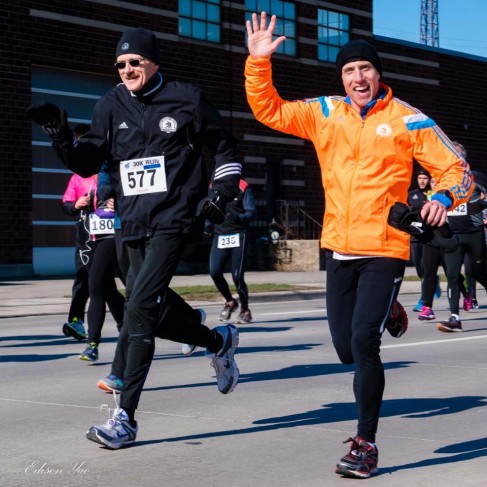From energy bars to bacon and eggs, Jean-Paul talks about the importance of post-race nutrition. He also delves into his all-or-nothing approach to conquering his goals with endurance training.
BY: JP Bedard
Dear JP:
How do you fuel your body for energy and recovery? Do you have a disciplined plan or do you just eat ALL the food?
Sincerely,
Sue
Dear Sue:
There was a time I could “just eat all the food.” Sadly, that time has passed. Considering the heavy weekly mileage I log, I’m fairly healthy, but my one Achilles Heel has always been my stomach. As a result, ideally my prerace meal takes place 3 hours before a race, and I typically don’t eat before my weekly long run – opting instead to fuel during my run with gels and protein bars. For most of my training cycle, I prefer to eat many small meals throughout the day, and a big dinner with a 60:40 (carbohydrate to protein) ratio.
When it comes to fueling for endurance running, timing is everything. I see a lot of runners dealing with upset stomachs in the finish chute of marathons. Most likely the culprit is over hydration the minute they cross the finish line. It’s important to remember that you’re more than likely going to be quite thirsty when you get to the end of the marathon or half marathon, but it’s always a little easier on your tummy if you just sip water or Gatorade rather than chugging it down.
It’s important refuel your body after a race or hard training run (lasting 45-60+ minutes depending on your level of fitness). There are 2 important refueling windows: The first reloading window occurs approximately 30 minutes after this type of sustained effort. Aim to consume roughly 300 calories during this first window, and focus on a 3:1 ratio (carbohydrates to protein). I typically reach for Greek yogurt with some fruit or granola, or a banana and some peanut butter. You can also use an energy recovery bar, but be sure to read the ingredients carefully because some of the bars on the market are loaded with sugar. To be honest, I usually steer clear of energy bars immediately following my runs, as I tend to eat a fair number of them already throughout the week whenever I’m stuck for an afternoon snack or feeling particularly irritable and RUNgry.
The second window of nutrition recovery occurs between 90 minutes and 3 hours after an endurance workout or race. The trick here is not to overload your stomach with a massive meal, but rather to focus on taking on the appropriate balance of nutrition. Here you want to increase the protein content and add a little bit of fat to your meal. Protein shakes and green smoothies are a good option, but I prefer chicken salad or eggs and bacon.
Dear JP:
You seem to be always in training mode…. do you ever feel like you are not mentally prepared/ need a break before committing to another marathon?
Sincerely,
Yota
Dear Yota:
Before I write anything further, I should provide a ‘disclaimer. I am a recovering addict, so the word moderation is not in my lexicon. My wife says I have two speeds – “full on” and “full off”.
From an outsider’s perspective, it may appear as though I’m “always in training mode”, but that’s not the way I’ve been approaching my running practice for the past three years. Because I always have another marathon or ultra on the horizon, I keep my base mileage relatively high throughout the entire year (180-220 km/week). I’m no longer chasing specific time goals in my races, so any race-specific training or tweaks to my schedule typically involves either adding in more hills (to prepare for a hilly course) or including a second weekly long run (to help build endurance for an ultra race).
When it comes to building mental stamina, there really are no secrets to success. I simply put in the miles day after day, and when the weather conditions are particularly nasty, instead of complaining, I remind myself how running through adversity builds character. And as anyone who has witnessed the human carnage of the last 5k of marathon can tell you, it’s “character” that will drag your butt across the finish line!
I’ve battled through a lot of difficult times in my life, and I certainly feel stronger as a result of weathering that process. I think the reason I love long distance running so much is that it reminds me that life has little to do with striving for goals and chasing after dreams, and everything to do with scraping up against boundaries of discomfort. It is within that dance with discomfort, that we find a guiding faith, a dose of patience, and the will to navigate those delicate spaces.







 Current Issue
Current Issue Previous Issue
Previous Issue Prior Release
Prior Release
